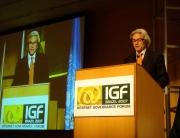Net neutrality is the idea that all data on the Internet should be treated equally. In other words, neither governments nor Internet service providers should change the pricing or availability regardless of the user, content-accessed, application, type of equipment, or modes of communication. Proponents of net neutrality are concerned broadband providers may use their infrastructure to block Internet websites, services, or protocols and eliminate competition, forcing consumers to use their services. Opponents often say service providers have no plans to block content or degrade network performance, even though there have been cases of this type of anti-competitive activity. They further argue that some data discrimination is necessary to guarantee quality of service.
“Network neutrality is best defined as a network design principle. The idea is that a maximally useful public information network aspires to treat all content, sites, and platforms equally.” – Tim Wu, Columbia Law School
A full definition and details of network neutrality can be found here:
http://timwu.org/network_neutrality.html
1. Background:
Net Neutrality in the UK
Ofcom, the independent regulator and competition authority for the UK communications industries wrote in their 2011 “Approach to net neutrality” that some forms of traffic management may be beneficial.” According to Ofcom:
It is possible to identify two broad forms of internet traffic management:
• ‘Best-efforts’ internet access, under which network operators attempt to convey all traffic on more or less equal terms. This results in an ‘open internet’ with no specific services being hindered or blocked, although some may need to be managed during times of congestion.
• Managed Services, under which network operators prioritise certain traffic according to the value they ascribe to it. An example may be the prioritisation of a high quality IPTV service over other traffic. This amounts to a form of discrimination, but one that is normally efficiency enhancing.
For more information on Ofcom, visit their website:
Some of the UK’s biggest ISPs have signed a voluntary code of practice by the Broadband Stakeholder Group (BSG) committing them to supporting the open Internet. A copy of the code of practice can be found here:
Net Neutrality in the EU
In Spring 2013, the European Council (EC) requested the European Commission made a proposal for achieving a single market in telecoms. On the 11 September 2013 they adopted a legislative package for a “Connected Continent: Building a Telecoms Single Market”. It called for the protection of an Open Internet, including net neutrality. The package can be found at:
http://ec.europa.eu/digital-agenda/en/connected-continent-legislative-package
Others have argued that the EC’s so-called protection of an Open Internet fails to provide net neutrality. Policy analyst and LSE visiting fellow Monica Horten of Iptegrity.com argued on the LSE Media Policy Project’s blog in September 2013,
The text does indeed contain words to the effect that ISPs should not discriminate, but it falls a long way short of the kind of non-discrimination rule that would ensure they won’t. Instead, the overall impact of the proposed law would mitigate in favour of those ISPs who want to charge for content delivery. In a nutshell, no roadblocks are permitted, but selective VIP lanes are. ISPs may also vary the speed limits so that people simply cannot get where they want to go in the time required – if where they are going does not suit the ISP. To put it another way, they may not block but they may prioritise.
The full blog post can be found at:
A link to Iptegrity’s website:
Net Neutrality in the US:
On Jan. 14, A US court overturned portions of the Federal Communications Commission’s (FCC) contentious net neutrality rules, deciding the FCC does not have the authority to dictate what wireless carriers can charge to whom and when.
Read more about that decision from law professor Ellen Goodman in her post on the LSE Media Policy Project blog:
2. Key Documents
UK: In Executive Summary of Ofcom’s approach to Net Neutrality (published 24 November 2011), Ofcom emphasizes that due to the massive growth and demand of connectivity, there is particular importance in Internet traffic management. Two types of service that achieve traffic management are: ‘Best Efforts’ Internet access; and ‘Managed Services’. Ofcom’s approach aims for these two services to co-exist, and would therefore consider exercising powers, which would allow Ofcom to safeguard ‘Best Efforts’ access by imposing a minimum quality of service on communication providers. Ofcom does not support any blocking of alternative services by providers of Internet access, and currently believe that the operation of market forces will address issues of blocking and discrimination. The full report can be found at:
http://stakeholders.ofcom.org.uk/binaries/consultations/net-neutrality/statement/statement.pdf
A copy of Parliament’s motion in 2010 on the Internet Neutrality Principle can be found at:
http://www.parliament.uk/edm/2010-12/1036
EU: In April 2011, the European Commission requested that the Body of European Regulators for Electronic Communications (BEREC) undertake a fact-finding exercise on crucial issues to ensuring open and neutral Internet. As a result, BEREC published a report of its traffic management investigation in May 2012. BEREC found that the investigation showed an undeniable problem regarding open Internet. The results of the investigation can be found at:
In December 2012, BEREC published reports on guidelines on quality of service, the differentiation practices and related competition issues, and IP interconnection. They can be found, respectively, at:
All of these reports, and additional documents, speeches, and press releases can be found at:
http://ec.europa.eu/digital-agenda/en/eu-actions
US: In August 2013, the FCC’s Open Internet Advisory Committee published an annual report, which aims to advise the FCC on how to enforce, reflect upon, and improve its Open Internet Report and Order from 2010. The full report can be found at:
http://transition.fcc.gov/cgb/oiac/oiac-2013-annual-report.pdf
The D.C. Circuit Court of Appeals 63-page opinion in Verizon vs. FCC, the case that overturned the FCC’s authority can be found at:
3. Key participants
Tim Wu: A professor at Columbia Law School, Tim Wu coined the term ‘network neutrality’ in his paper Network Neutrality, Broadband Discrimination. His bio can be found on his personal website, at:
His full paper on Network Neutrality:
http://papers.ssrn.com/sol3/papers.cfm?abstract_id=388863
Ofcom: Ofcom operates in contingency with the UK’s Communications Act 2003, and amended in 2010. Ofcom’s role as outlined by the Act can be found at:
http://www.legislation.gov.uk/ukpga/2003/21/contents
Ofcom is comprised of the Ofcom Board, the Executive Committee, the Policy Executive, the Spectrum Clearance and Awards Programme Board, the Content Board, and various Committees. Descriptions of each subgroup’s roles and links to their members can be found at:
http://www.ofcom.org.uk/about/how-ofcom-is-run/
European Commission: The European Commission Directorate General for Communications Networks, Content & Technology, manages The Digital Agenda of the EU. The Digital Agenda works under the direction of Neelie Kroes. A directory for this Directorate General can be found on their website at:
http://ec.europa.eu/dgs/connect/en/content/dg-connect
Neelie Kroes is a Dutch politician of the People’s Party for Freedom and Democracy, and is currently Vice Presidents of the European Commission. She is leading the Digital Agenda for Europe, the EU’s strategy to help digital technologies, including the Internet, to deliver sustainable economic growth. On her blog, she states that in the debate of net neutrality, it is key to avoid overregulation. Kroes believes that offering premium services has benefits to the consumer, and under her proposals, the ‘Best Efforts’ Internet will be improved. Kroes’ European Commission webpage can be found at:
http://ec.europa.eu/commission_2010-2014/kroes/
Kroes’ full blog post on net neutrality can be found at:
http://ec.europa.eu/commission_2010-2014/kroes/en/blog/open-internet
FCC: Five commissioners appointed by the U.S. President, one of which serves as Chairman, direct The FCC. Full bios of the Commissioners can be found at:
The FCC’s Open Internet Advisory Committee deals with Open Internet rules, such as transparency, reasonable network management practices, broadband services, specialized services, and the state of competition. Their website, which includes a list of staff members and bios of the Chairman and Vice Chair, can be found at:
http://www.fcc.gov/encyclopedia/open-internet-advisory-committee
Appendix
- Press Samples
BBC article on US federal appeals court decision (2014):
http://www.bbc.co.uk/news/technology-25743200
BBC’s summary of the net neutrality debate in the UK (2010):
http://www.bbc.co.uk/news/technology-10924691
WiredUK article on European Parliament’s adoption of the net neutrality resolution (published 17 November 2011):
http://www.wired.co.uk/news/archive/2011-11/18/net-neutrality-vote
- Samples of countries that have adopted net neutrality law:
Netherlands: New legislation in the Netherlands made it the first country in Europe to establish a legal framework supporting net neutrality. On 22 June 2011, the Dutch Parliament passed a law stopping mobile operators from blocking or charging extra for voice calling done via the net.
Articles on the Netherlands’ law on net neutrality (2011):
http://www.bbc.co.uk/news/technology-13886440
http://www.theregister.co.uk/2011/06/09/netherlands_1st_european_country_to_adopt_net_neutrality/
Chile: On 13 June 2010, the National Congress of Chile, amended its telecommunications law in order to preserve network neutrality. Chile became one of the first countries in the world to enact net neutrality legislation.
Articles on Chile’s law on net neutrality (2010):
http://www.v3.co.uk/v3-uk/news/1961015/chile-net-neutrality-nation
http://www.internetevolution.com/author.asp?doc_id=194727 (includes link to full details of the bill)
Slovenia: Details of Slovenia’s adoption of net neutrality law (in December 2013):
http://broabandtrafficmanagement.blogspot.co.uk/2013/01/slovenia-adopts-net-neutrality-law.html
http://radiobruxelleslibera.wordpress.com/2013/01/03/slovenia-reinforces-net-neutrality-principles/
A paper on net neutrality law, by Christopher Marsden of the University of Sussex Law School:
http://papers.ssrn.com/sol3/papers.cfm?abstract_id=2335359









